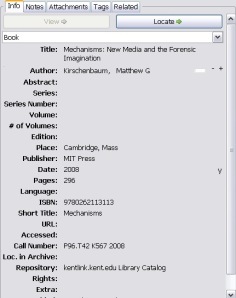In preparing to respond to Les Harrison’s post, I decided that I wanted to read part of Matt Kirschenbaum’s Mechanisms, because I’d been planning to read it anyway and need an excuse to do so with dispatch. I looked it up in the card catalog, saved it to my trusty Zotero web tool for bibliographies, printed a report, and headed for the stacks.
Matt’s book was not where it was supposed to be. And yet, when I checked the catalog again (after going home) it shows up as being available. What’s the deal? Well, it turns out that Zotero and the library do not agree on the card catalog number. Here’s the Zotero record:

And here’s the Kent Card Catalog record,
![]()
Notice the discrepancy? According to Zotero, the card catalog number is P96.T42 bK567 2008. But according to the library web site, the card catalog number is TK7895.M4 bK488 2008.
What gives? Well, it turns out that a book can have two LOC card catalog numbers. If you click the image of the Kent Library card catalog number above, you can go directly to the library’s record. When you get there, click MARC Display button on top middle of screen.
For a guide to reading MARC records, see LOC’s Guide to reading MARC records. Field 050 (list of other fields in LOC reference) is the Library of Congress card catalog number. Kirschenbaum’s book, Mechanisms, has two LOC Card Catalog Numbers.
It appears that the Kent library’s implementation is to display the bottom (or second?) record. Are books always put there? Or is there a separate flag set in a library DB? How would a user know? Zotero, in contrast, appears to import the first field labeled 050.
Tomorrow it’s back to the library to see if the actual book is where the record says it is. From a user perspective, is this a bug? Probably, but it will take committee of librarians to solve it by publishing best practices, by pushing libraries to conform to it, and by having software vendors reflect librarian’s best practices. It probably won’t happen, but I can wish. But there is a real social cost, 30 to 45 minutes of my time. Multiplied thousands of times, this is a genuine social cost, which a committee of librarians could move a long way to solving, one would think.
I guess I’ll forward it to my librarian friends at CLIR and see whether they know someone who could get cracking. Takeaway lesson for scholars: If you can’t find a catalog record in your Zotero database, double-check card catalog. And check MARC record to see if the book has two catalog numbers. It might be in the other place.
UPDATE: My library-savvy friends at CLIR remind me that cataloging is an art: it’s not a science. A similar issue has already been posted on the Zotero Form. And it’s time for me to contact my library liaison and bring up this issue. If Matt, the author, intends to be in the humanities (see his comment below), by gum I’ll try to get his book there, at least in the Kent University Library. Library catalog numbers are texts, and they too are subject to errors or improper cataloging.
By the way, Matt’s book was in the TK section. The quarter that I’ve read is really fun–in a scholarly sort of way–although it’s a hard slog when he decides to teach textual scholars how to use bitstream editors.

I think I can shed some light. The book was initially assigned the TK call number by LoC, which would have placed it over in the Engineering Stacks. I wrote an appeal, and got it changed to P (Language and Literature). I guess it’s good to know that MARC is recording both.
Thanks, Matt. The double LOC number–I did not know about appeals or double entries for 050 in MARC records–seems like a great sample for an introductory research methods course. Nor could I, without more research, determine the Zotero defaults or the library catalog display defaults. Either may draw from MARC, or back-end database to library catalog may flag the designated entry for display. As a “bug” with social costs, I’m sensitive to it because I just incurred the cost. But as an engineering problem, which demands the cooperation of multiple institutions, it seems like a tough nut to crack.
“. . . it’s a hard slog when he decides to teach textual scholars how to use bitstream editors.”
It seemed like a good idea at the time. ;-)